外研版(2019)必修三 Unit2 Making a difference Using language课件(共30张PPT)
文档属性
| 名称 | 外研版(2019)必修三 Unit2 Making a difference Using language课件(共30张PPT) |  | |
| 格式 | pptx | ||
| 文件大小 | 13.4MB | ||
| 资源类型 | 教案 | ||
| 版本资源 | 外研版(2019) | ||
| 科目 | 英语 | ||
| 更新时间 | 2025-01-10 15:02:43 | ||
图片预览

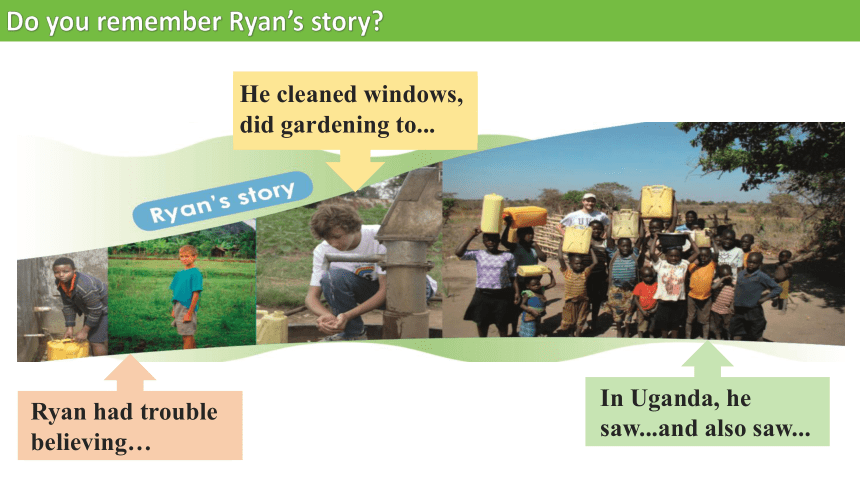
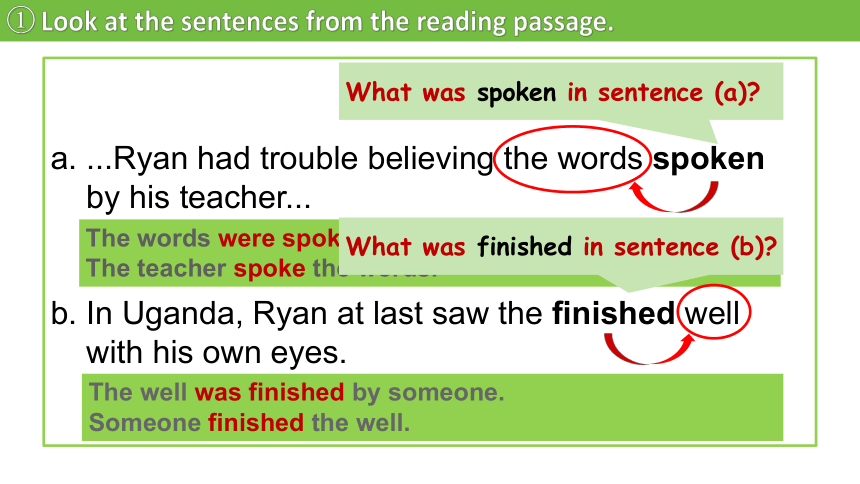
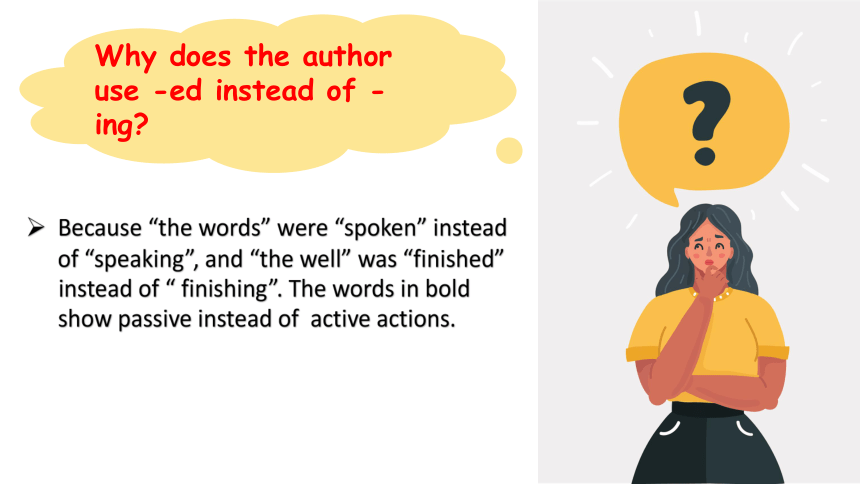
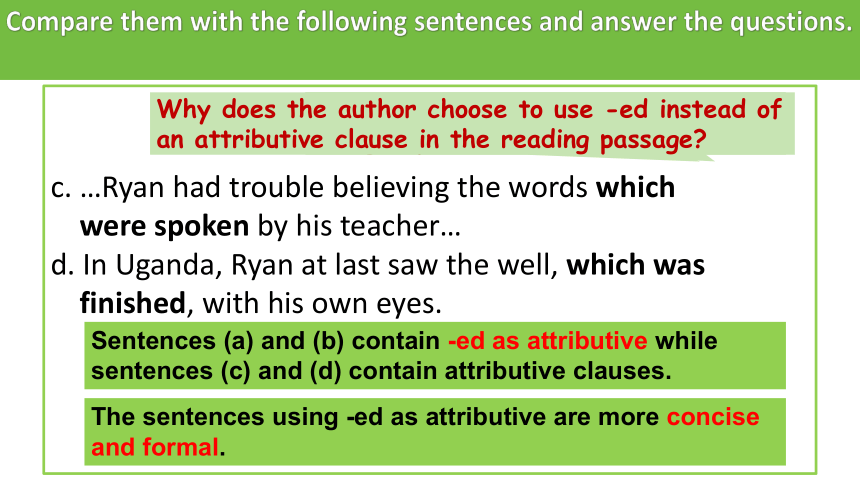
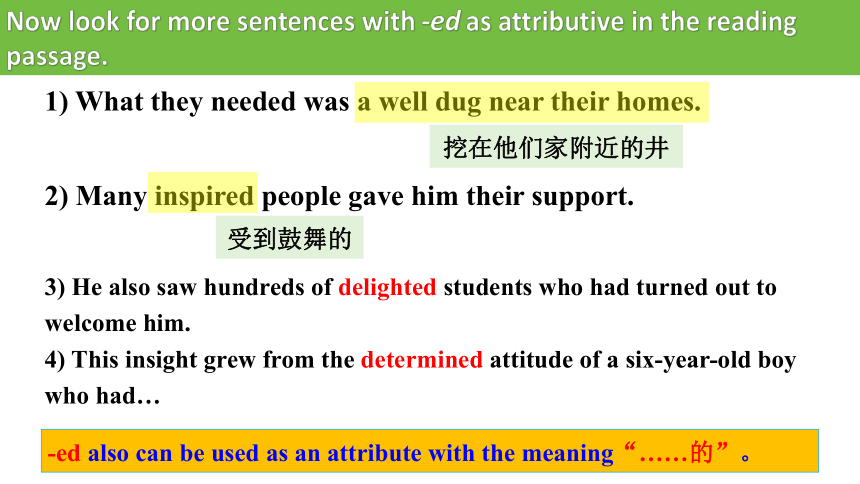
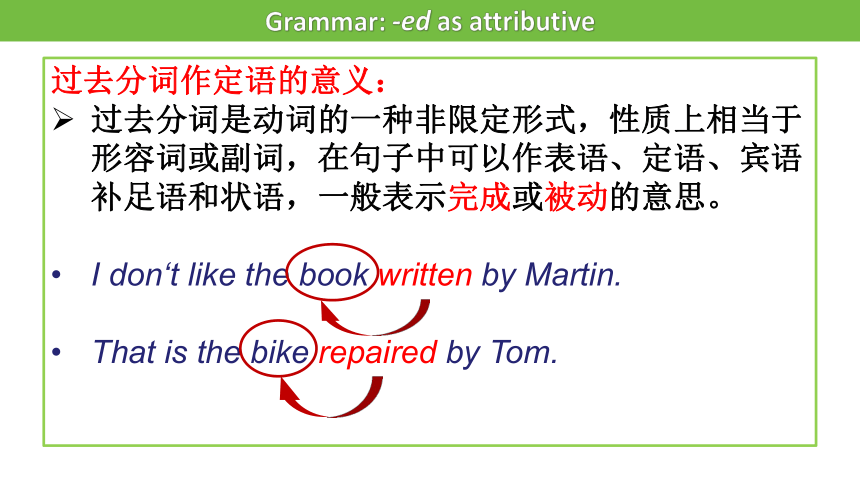
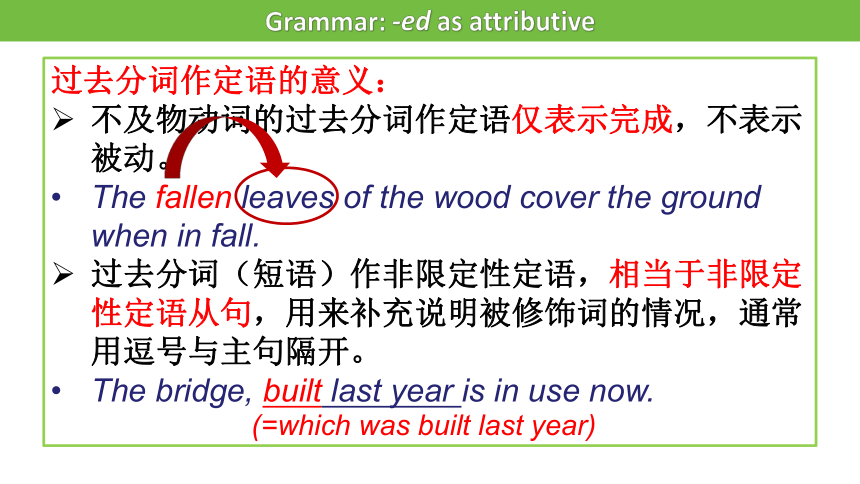
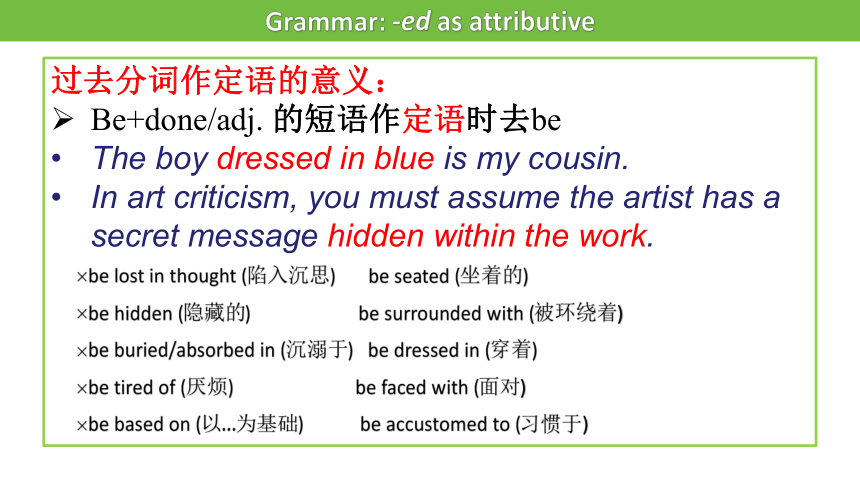

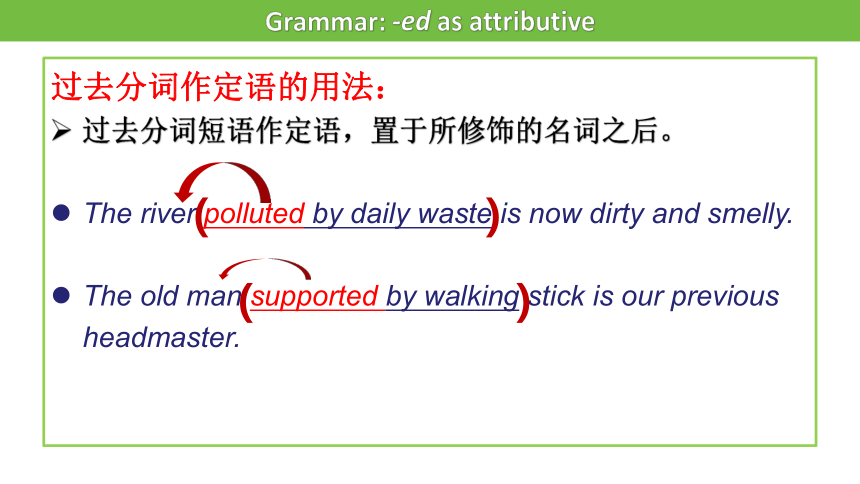
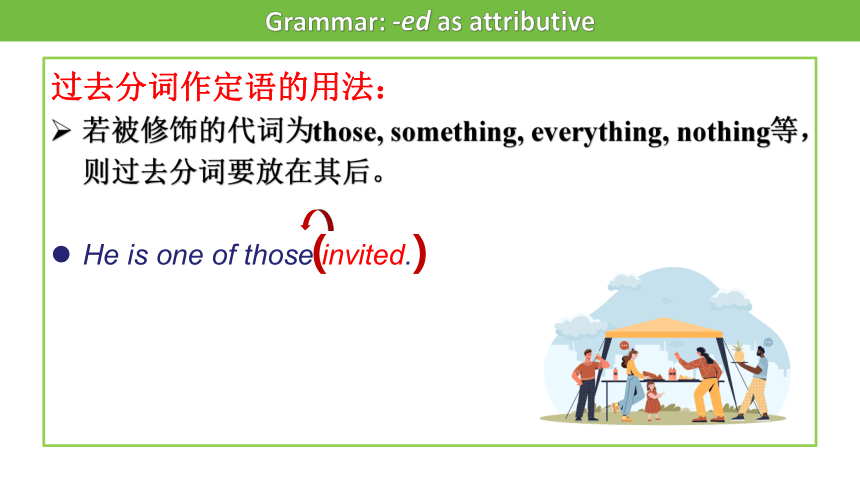
文档简介
(共30张PPT)
Unit 2
Making a difference
Using language
-ed as attributive
BY MICHELLE
Do you remember Ryan’s story
Ryan had trouble believing…
He cleaned windows, did gardening to...
In Uganda, he saw...and also saw...
a. ...Ryan had trouble believing the words spoken
by his teacher...
b. In Uganda, Ryan at last saw the finished well
with his own eyes.
The words were spoken by the teacher.
The teacher spoke the words.
① Look at the sentences from the reading passage.
What was spoken in sentence (a)
What was finished in sentence (b)
The well was finished by someone.
Someone finished the well.
Why does the author use -ed instead of -ing
Because “the words” were “spoken” instead of “speaking”, and “the well” was “finished” instead of “ finishing”. The words in bold show passive instead of active actions.
Compare them with the following sentences and answer the questions.
c. …Ryan had trouble believing the words which
were spoken by his teacher…
d. In Uganda, Ryan at last saw the well, which was
finished, with his own eyes.
What is the difference between the two groups of sentences
Sentences (a) and (b) contain -ed as attributive while sentences (c) and (d) contain attributive clauses.
Why does the author choose to use -ed instead of an attributive clause in the reading passage
The sentences using -ed as attributive are more concise and formal.
Now look for more sentences with -ed as attributive in the reading passage.
1) What they needed was a well dug near their homes.
挖在他们家附近的井
2) Many inspired people gave him their support.
受到鼓舞的
3) He also saw hundreds of delighted students who had turned out to welcome him.
4) This insight grew from the determined attitude of a six-year-old boy who had…
-ed also can be used as an attribute with the meaning“……的”。
Grammar: -ed as attributive
过去分词作定语的意义:
过去分词是动词的一种非限定形式,性质上相当于形容词或副词,在句子中可以作表语、定语、宾语补足语和状语,一般表示完成或被动的意思。
I don‘t like the book written by Martin.
That is the bike repaired by Tom.
Grammar: -ed as attributive
过去分词作定语的意义:
不及物动词的过去分词作定语仅表示完成,不表示被动。
The fallen leaves of the wood cover the ground when in fall.
过去分词(短语)作非限定性定语,相当于非限定性定语从句,用来补充说明被修饰词的情况,通常用逗号与主句隔开。
The bridge, built last year is in use now.
(=which was built last year)
Grammar: -ed as attributive
过去分词作定语的意义:
Be+done/adj. 的短语作定语时去be
The boy dressed in blue is my cousin.
In art criticism, you must assume the artist has a secret message hidden within the work.
be lost in thought (陷入沉思) be seated (坐着的)
be hidden (隐藏的) be surrounded with (被环绕着)
be buried/absorbed in (沉溺于) be dressed in (穿着)
be tired of (厌烦) be faced with (面对)
be based on (以…为基础) be accustomed to (习惯于)
Grammar: -ed as attributive
过去分词作定语的用法:
单个分词作定语,一般置于被修饰的名词之前,常表示已经完成的动作(或没有一定时间性的动作)。
In Uganda, Ryan at last saw the finished well with his own eyes.
The polluted water was to blame for the spread of cholera.
There are two broken cups on the ground.
(
)
(
)
(
)
Grammar: -ed as attributive
过去分词作定语的用法:
过去分词短语作定语,置于所修饰的名词之后。
The river polluted by daily waste is now dirty and smelly.
The old man supported by walking stick is our previous headmaster.
(
)
(
)
Grammar: -ed as attributive
过去分词作定语的用法:
若被修饰的代词为those, something, everything, nothing等,则过去分词要放在其后。
He is one of those invited.
(
)
Grammar: -ed as attributive
过去分词作定语的用法:
当过去分词或过去分词短语位于被修饰的名词之后时,往往可用定语从句代替。
Most of the guests invited to the party were my classmates.= Most of the guests who were invited to the party were my classmates.
Summary
1. 单个词做定语放名词前,短语放名词后。
2. 过去分词做定语表被动完成。
2. 现在分词做定语表主动进行。
3. 动词不定式表将来。
4. 被动进行用being done.
5. 特殊用法特殊记。
6. 带be+adj/done 请去be,剩下部分可以做定状补。
7. 过去分词作定语可与被动语态定语从句换而现在分词可与主动语态换。
② Read the discussion between two students about Ryan’s foundation. Rewrite the underlined sentences using the
-ed form.
Ryan is a young man admired by a lot of people. The money raised by his foundation supports schools and communities in Africa.
② Read the discussion between two students about Ryan’s foundation. Rewrite the underlined sentences using the
-ed form.
As in the words spoken by Ryan, we need to not only donate money but also get new ideas. I think the support needed includes new technology for recycling water and education on how to use and save water.
③Read the passage and choose the correct form of the verbs.
v.-ing 表示正在进行中的
v.-ing修饰those, those与live之间为主动关系
Personal qualities
④ Read the descriptions and underline the words that describe personal qualities.
⑤ Put the words you underlined in Activity ④ into the table. Add any more you can think of.
Positive Neutral Negative
independent
generous
honest
confident
creative
easygoing
sensitive
serious
bookish
shy
nervous
lazy
loyal
intelligent
warm-hearted
straightforward
self-conscious
strict
short-sighted
selfish
mean
slack
⑥ Work in pairs. Talk about people’s personal qualities using the words you have learnt.
A: I think my cousin is very brave.
B: Why do you think so
…
To be a volunteer
Do You Know
Ryan’s charity work is not unusual. Many people
donate money and others volunteer to help run
charities. On most UK high streets, for example,
you will often come across people raising money
and looking for volunteers for Cancer Research UK,
the British Heart Foundation, the Royal National
Lifeboat Institution and many more. In China,
volunteers are also playing an increasingly important role in environmental
protection, disability assistance and many other fields.
Being a volunteer is very common.
Volunteers are playing an important role in many fields.
What adjectives can you think of to describe a volunteer
committed
dedicated
enthusiastic
willing
selfless
passionate
helpful
friendly
responsible
Volunteers make a difference, and can change lives!
⑦ Listen to the phone enquiry and complete the sentences with the correct ending.
a teaching children with disabilities
b when Sarah can start work
c if Sara is suitable for the work
d horses and being with children
e helping out three times a week
f taking care of old people
1 Sarah likes ____.
2 The man suggests ____.
3 Erica Marshall needs to know ____.
d
a
c
⑧ Listen again and complete the form.
working with children
riding horses
have fun
still enjoy sports
one on one
build a relationship with them
as a volunteer
reference from someone who knows you
Now talk about how Sarah makes a phone enjuiry on becoming a volunteer. Listen again if necessary.
Before making a phone enquiry, take a moment to
prepare your questions. Take notes if necessary. Also,
remember that it’s okay to ask again when you think
it’s not clear enough!
Now talk about how Sarah makes a phone enjuiry on becoming a volunteer. Listen again if necessary.
I’m interested in doing some sort of voluntary work.
Could you tell me how to become a volunteer
I enjoy working with children so…
Can you tell me a bit more about it
What should I do to get the work
Is there anything else I need to know
⑨ Work in pairs and act out a telephone enquiry.
Student A: Turn to Page 105.
Student B: Turn to Page 109.
Summarize the usage of -ed as attributive and do the relevant exercises.
Think about other voluntary work you would like to be involved in, and have a similar conversation.
Homework
THANKS FOR WATCHING
Unit 2
Making a difference
Using language
-ed as attributive
BY MICHELLE
Do you remember Ryan’s story
Ryan had trouble believing…
He cleaned windows, did gardening to...
In Uganda, he saw...and also saw...
a. ...Ryan had trouble believing the words spoken
by his teacher...
b. In Uganda, Ryan at last saw the finished well
with his own eyes.
The words were spoken by the teacher.
The teacher spoke the words.
① Look at the sentences from the reading passage.
What was spoken in sentence (a)
What was finished in sentence (b)
The well was finished by someone.
Someone finished the well.
Why does the author use -ed instead of -ing
Because “the words” were “spoken” instead of “speaking”, and “the well” was “finished” instead of “ finishing”. The words in bold show passive instead of active actions.
Compare them with the following sentences and answer the questions.
c. …Ryan had trouble believing the words which
were spoken by his teacher…
d. In Uganda, Ryan at last saw the well, which was
finished, with his own eyes.
What is the difference between the two groups of sentences
Sentences (a) and (b) contain -ed as attributive while sentences (c) and (d) contain attributive clauses.
Why does the author choose to use -ed instead of an attributive clause in the reading passage
The sentences using -ed as attributive are more concise and formal.
Now look for more sentences with -ed as attributive in the reading passage.
1) What they needed was a well dug near their homes.
挖在他们家附近的井
2) Many inspired people gave him their support.
受到鼓舞的
3) He also saw hundreds of delighted students who had turned out to welcome him.
4) This insight grew from the determined attitude of a six-year-old boy who had…
-ed also can be used as an attribute with the meaning“……的”。
Grammar: -ed as attributive
过去分词作定语的意义:
过去分词是动词的一种非限定形式,性质上相当于形容词或副词,在句子中可以作表语、定语、宾语补足语和状语,一般表示完成或被动的意思。
I don‘t like the book written by Martin.
That is the bike repaired by Tom.
Grammar: -ed as attributive
过去分词作定语的意义:
不及物动词的过去分词作定语仅表示完成,不表示被动。
The fallen leaves of the wood cover the ground when in fall.
过去分词(短语)作非限定性定语,相当于非限定性定语从句,用来补充说明被修饰词的情况,通常用逗号与主句隔开。
The bridge, built last year is in use now.
(=which was built last year)
Grammar: -ed as attributive
过去分词作定语的意义:
Be+done/adj. 的短语作定语时去be
The boy dressed in blue is my cousin.
In art criticism, you must assume the artist has a secret message hidden within the work.
be lost in thought (陷入沉思) be seated (坐着的)
be hidden (隐藏的) be surrounded with (被环绕着)
be buried/absorbed in (沉溺于) be dressed in (穿着)
be tired of (厌烦) be faced with (面对)
be based on (以…为基础) be accustomed to (习惯于)
Grammar: -ed as attributive
过去分词作定语的用法:
单个分词作定语,一般置于被修饰的名词之前,常表示已经完成的动作(或没有一定时间性的动作)。
In Uganda, Ryan at last saw the finished well with his own eyes.
The polluted water was to blame for the spread of cholera.
There are two broken cups on the ground.
(
)
(
)
(
)
Grammar: -ed as attributive
过去分词作定语的用法:
过去分词短语作定语,置于所修饰的名词之后。
The river polluted by daily waste is now dirty and smelly.
The old man supported by walking stick is our previous headmaster.
(
)
(
)
Grammar: -ed as attributive
过去分词作定语的用法:
若被修饰的代词为those, something, everything, nothing等,则过去分词要放在其后。
He is one of those invited.
(
)
Grammar: -ed as attributive
过去分词作定语的用法:
当过去分词或过去分词短语位于被修饰的名词之后时,往往可用定语从句代替。
Most of the guests invited to the party were my classmates.= Most of the guests who were invited to the party were my classmates.
Summary
1. 单个词做定语放名词前,短语放名词后。
2. 过去分词做定语表被动完成。
2. 现在分词做定语表主动进行。
3. 动词不定式表将来。
4. 被动进行用being done.
5. 特殊用法特殊记。
6. 带be+adj/done 请去be,剩下部分可以做定状补。
7. 过去分词作定语可与被动语态定语从句换而现在分词可与主动语态换。
② Read the discussion between two students about Ryan’s foundation. Rewrite the underlined sentences using the
-ed form.
Ryan is a young man admired by a lot of people. The money raised by his foundation supports schools and communities in Africa.
② Read the discussion between two students about Ryan’s foundation. Rewrite the underlined sentences using the
-ed form.
As in the words spoken by Ryan, we need to not only donate money but also get new ideas. I think the support needed includes new technology for recycling water and education on how to use and save water.
③Read the passage and choose the correct form of the verbs.
v.-ing 表示正在进行中的
v.-ing修饰those, those与live之间为主动关系
Personal qualities
④ Read the descriptions and underline the words that describe personal qualities.
⑤ Put the words you underlined in Activity ④ into the table. Add any more you can think of.
Positive Neutral Negative
independent
generous
honest
confident
creative
easygoing
sensitive
serious
bookish
shy
nervous
lazy
loyal
intelligent
warm-hearted
straightforward
self-conscious
strict
short-sighted
selfish
mean
slack
⑥ Work in pairs. Talk about people’s personal qualities using the words you have learnt.
A: I think my cousin is very brave.
B: Why do you think so
…
To be a volunteer
Do You Know
Ryan’s charity work is not unusual. Many people
donate money and others volunteer to help run
charities. On most UK high streets, for example,
you will often come across people raising money
and looking for volunteers for Cancer Research UK,
the British Heart Foundation, the Royal National
Lifeboat Institution and many more. In China,
volunteers are also playing an increasingly important role in environmental
protection, disability assistance and many other fields.
Being a volunteer is very common.
Volunteers are playing an important role in many fields.
What adjectives can you think of to describe a volunteer
committed
dedicated
enthusiastic
willing
selfless
passionate
helpful
friendly
responsible
Volunteers make a difference, and can change lives!
⑦ Listen to the phone enquiry and complete the sentences with the correct ending.
a teaching children with disabilities
b when Sarah can start work
c if Sara is suitable for the work
d horses and being with children
e helping out three times a week
f taking care of old people
1 Sarah likes ____.
2 The man suggests ____.
3 Erica Marshall needs to know ____.
d
a
c
⑧ Listen again and complete the form.
working with children
riding horses
have fun
still enjoy sports
one on one
build a relationship with them
as a volunteer
reference from someone who knows you
Now talk about how Sarah makes a phone enjuiry on becoming a volunteer. Listen again if necessary.
Before making a phone enquiry, take a moment to
prepare your questions. Take notes if necessary. Also,
remember that it’s okay to ask again when you think
it’s not clear enough!
Now talk about how Sarah makes a phone enjuiry on becoming a volunteer. Listen again if necessary.
I’m interested in doing some sort of voluntary work.
Could you tell me how to become a volunteer
I enjoy working with children so…
Can you tell me a bit more about it
What should I do to get the work
Is there anything else I need to know
⑨ Work in pairs and act out a telephone enquiry.
Student A: Turn to Page 105.
Student B: Turn to Page 109.
Summarize the usage of -ed as attributive and do the relevant exercises.
Think about other voluntary work you would like to be involved in, and have a similar conversation.
Homework
THANKS FOR WATCHING
